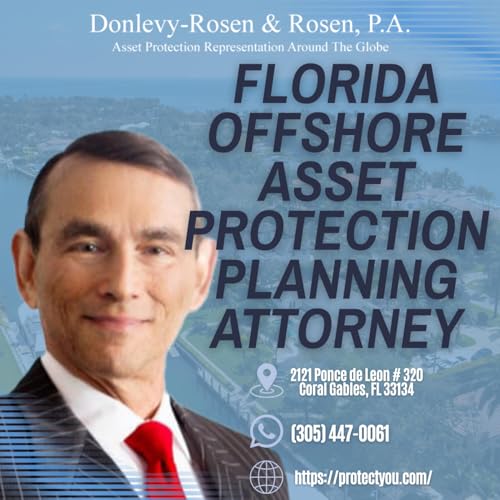
Asset Protection Explained: Offshore Trusts, Taxes & Wealth Security with Howard Rosen
Failed to add items
Add to basket failed.
Add to Wish List failed.
Remove from Wish List failed.
Follow podcast failed
Unfollow podcast failed
-
Narrated by:
-
By:
About this listen
https://protectyou.com/
(305) 447-0061
Howard Rosen has been a Certified Public Accountant since 1974, and his career has spanned decades of work in taxation and asset protection. Today, as the founder of ProtectYou.com, Rosen specializes in offshore trust structures designed to help clients shield their wealth from creditors and legal challenges.
For more than 33 years, Rosen’s firm has guided doctors, entrepreneurs, and business owners through the intricacies of asset protection. While his early clients were largely physicians, today many are entrepreneurs who have sold their companies and now face the challenge of preserving significant liquid assets. His approach is rooted in a combination of tax expertise—sharpened by ten law school tax courses—and decades of practical success.
One of the most powerful tools Rosen employs is the offshore trust. The Cook Islands, in particular, has become a leading jurisdiction for such structures since introducing its International Trust Act in 1984. With no treaties requiring recognition of U.S. court judgments, the Cook Islands provides a strong layer of security for assets. Rosen, who has visited the islands more than 20 times, emphasizes that no properly structured offshore trust has ever been penetrated by a creditor.
Still, Rosen stresses that these arrangements are not without risk—especially when misunderstood. Many clients mistakenly believe they can continue to control their assets within the trust, not realizing that beneficiaries are subject to the discretion of trustees. Tax misconceptions also abound, as clients may not understand when gift taxes apply or how distributions are treated under federal law. Inexperienced practitioners who rely on generic trust forms can compound these risks, creating serious tax issues for clients.
Another challenge lies in client behavior. Some individuals fail to follow professional advice, exposing themselves to unnecessary risks despite having invested in an offshore trust. Rosen’s success rate—he claims 100% asset protection since founding his firm in 1991—depends on careful planning and clients adhering to the rules.
Looking back, Rosen offers candid advice to younger attorneys: prioritize learning before speaking. The complexities of asset protection demand humility, patience, and a strong foundation in tax law. At the same time, he acknowledges that today’s due diligence requirements are more stringent than ever, making the practice both demanding and rewarding.
Ultimately, Rosen views asset protection as a vital part of financial planning. It is not about evasion but about creating stability, preserving wealth, and ensuring that what clients have built remains safe for future generations. Offshore trusts, when carefully crafted, remain one of the strongest tools to achieve that goal.
Sponsors:
- RankWith.News
- The Attorney Post
- National ERC
- Andropology


